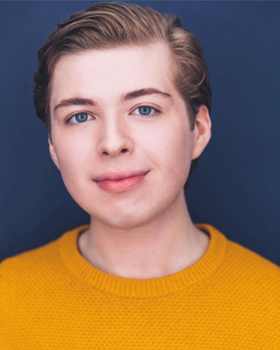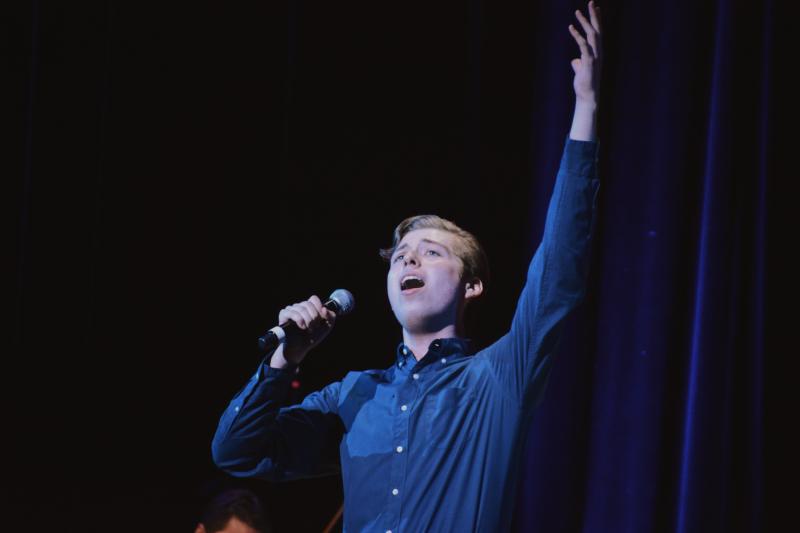Interview: NJ Actor Will Brockman in BROADWAY RISING STARS

Broadwayworld.com recently had the pleasure of interviewing New Jersey native, Will Brockman who was selected to participate in Broadway Rising Stars, a performance that was held on Monday, July 16 at Town Hall in New York City. This national showcase introduces audiences to the next generation of outstanding talent. Each of the nineteen participants, from top performing arts schools across the country, were chosen by a panel of discerning judges. Brockman filled us in about his background, his performance experiences, and plans for the future.
Will Brockman was born and raised in the suburbs of New Jersey, where he nourished his love for acting and singing from a young age. Will moved to New York to pursue his BFA in Acting at New York University's Tisch School of the Arts. While at NYU, Will studied at The Lee Strasberg Theatre & Film Institute, and his time there culminated in the selective Practicum program. The Strasberg Practicum program allowed Will to originate the role of Blake in Millennial Pink Falcon, a new play by Katie Hathaway. In the autumn of 2017, Will spent a semester in London studying classical acting at the Royal Academy of Dramatic Art. Upon graduating, Will was honored at the Tisch Drama Awards with the Outstanding Achievement in Studio Award for his work at Strasberg. Will recently made his debut at The Town Hall in Scott Siegel's Broadway Rising Stars. In his free time, you might find Will listening to Billy Joel, pretending to be a sommelier, or on the yoga mat.

Tell us about your very first memory of performing before an audience.
The first play I was ever in was a production of The Sound of Music when I was in fourth grade, and I played Friedrich von Trapp. At the time, I didn't have the vocabulary to describe my love of performing in the manner I do now. I just knew I liked the way I felt up on stage. I look back on it now and think of it as sparks of joy. There's a fulfillment I get from being on stage that I just can't get from any other area of life.
Who have your important mentors?
My biggest artistic influence is Geoffrey Horne, who I had the privilege of studying with during my time at Strasberg. He truly revolutionized the way I thought about acting. His style of teaching emphasizes the individual and discovering how to use your idiosyncrasies to your advantage. I always hear his voice in my head saying "everything about you is interesting" when I begin to create a character, and I cannot express how liberating it is to give yourself permission to start where you are. It stops you from pretending to be something and allows you to deal with what actually is.
We'd love to know a little about your time at Tisch School of the Arts.
Tisch was an eye opening experience for me. I've met so many different artists who have vastly different philosophies on what makes good theatre and good acting, and it allowed me to better understand where I see my work fitting in. Tisch also introduced me to some of the most wonderful people I've ever met. I really cherish having people in my life who are not only smart and creative actors but are also wonderful people.
What have been a few of your most memorable roles and why?
This past May, I worked with playwright Katie Hathaway and director Sarah Hartmann on the new work Millennial Pink Falcon. I originated the role of Blake, who is a UFOlogist who serves as the voice of inclusion in the show. In short, he wants his colleagues to view humanoid/extraterrestrial life not as a foe but as a source of intrigue we can learn and grow from. For me, it really resonated with current events and the dangers of othering the unknown. The text really allowed me to channel those sentiments of empathy into Blake, which enabled me to ground my character in a heightened world. More than that, I can't speak highly enough of the creative team of that show who went above and beyond to facilitate one of the most pleasant rehearsal processes I've ever been a part of.
Tell us about some of the challenges of your acting and singing career?
I think the biggest challenge of this industry is to stay sensitive in spite of any struggle you may face. This is a tough industry. That's no secret. But it's vital to remain connected with all the things that make you you. I'm constantly checking in with myself, always reevaluating my inner life. How do you have resilience and sensitivity at the same time? I certainly don't have a one-size-fits-all answer, but the one thing I am certain of is both are necessary as an actor.
What would you tell other young people who want to enter the profession?
Say yes to opportunity. Put yourself out there. No one can ever know what you can do unless you show them. Also, be kind to yourself. Be your own best advocate and trust your gut.
How did it feel to be a member of "Broadway Rising Stars?"
Broadway Rising Stars was such a privilege to be a part of. Working with Scott & Barbara Siegel as well as Farah Alvin was such a joy. The energy in the rehearsal room was of unbridled support and encouragement, and I think it truly led every single actor to give their best performance. I can't ever forget all of us huddled around the monitor in the basement of the Town Hall, watching our fellow cast mates perform. Every single person killed it that night; you could literally watch how electric and alive their performances were. It was such a short rehearsal process, but it was so intense that we all became deeply invested in each other's performances. It's that kind of support that is really a testament to the Siegels, because they set up the framework that allowed all of us to flourish.
What are your plans for the future?
In my career, I want to continue to be a part of projects that connect to the intrinsic humanity in all of us. That's the most important part of theatre to me. We go to the theatre to see our lives and experiences on stage. We go to remind ourselves that we're not alone. If I can use my performances to remind people how connected we all are, I would feel like I had done my job.
Anything else, absolutely anything you want BWW readers to know!
Something I actively try to do is to be curious about artistic disciplines that have nothing to do with theatre or acting. It helps me to keep my own creativity alive. I read a lot - I just read What Remains by Carole Radziwill. It's a book I've been meaning to read for a long time, and when I finally read it I was so struck by the lyrical structure of her sentences. It's stuff like that - seeing how people use their voice on the page, or how someone like Gustav Klimt used his voice through color and texture in his paintings - makes me think actively about how I'm using my voice in performance.
For more information on Will Brockman, visit his web site at https://www.willbrockman.com/. You can follow him on Instagram @will.brockman.
Photo Credit: Courtesy of Will Brockman
Comments
Videos

